 |
API - XOOPS 2.5.11 Beta 2
By monxoops.fr
|
 |
API - XOOPS 2.5.11 Beta 2
By monxoops.fr
|

Public Member Functions | |
| __construct () | |
| XoopsObject () | |
| setNew () | |
| unsetNew () | |
| isNew () | |
| setDirty () | |
| unsetDirty () | |
| isDirty () | |
| initVar ($key, $data_type, $value=null, $required=false, $maxlength=null, $options='', $enumerations='') | |
| assignVar ($key, $value) | |
| assignVars ($var_arr) | |
| setVar ($key, $value, $not_gpc=false) | |
| setVars ($var_arr, $not_gpc=false) | |
| destroyVars ($var) | |
| destoryVars ($var) | |
| setFormVars ($var_arr=null, $pref='xo_', $not_gpc=false) | |
| & | getVars () |
| getValues ($keys=null, $format='s', $maxDepth=1) | |
| getVar ($key, $format=null) | |
| cleanVars () | |
| registerFilter ($filtername) | |
| _loadFilters () | |
| loadFilters ($method) | |
| xoopsClone () | |
| __clone () | |
| setErrors ($err_str) | |
| getErrors () | |
| getHtmlErrors () | |
| toArray () | |
Data Fields | |
| $vars = array() | |
| $cleanVars = array() | |
| $_isNew = false | |
| $_isDirty = false | |
| $_errors = array() | |
| $_filters = array() | |
Base class for all objects in the Xoops kernel (and beyond)
| __construct | ( | ) |
constructor
normally, this is called from child classes only
@access public
Reimplemented in XoopsCacheModelObject, ArtObject, XoopsRank, XoUser, XoopsAvatar, XoopsComment, XoopsConfigCategory, XoopsConfigItem, XoopsConfigOption, XoopsGroup, XoopsMembership, XoopsGroupPerm, XoopsImage, XoopsImagecategory, XoopsImageSet, XoopsImagesetimg, XoopsModule, XoopsNotification, XoopsPrivmessage, XoopsTplfile, XoopsTplset, PmMessage, ProfileCategory, ProfileField, ProfileRegstep, ProfileVisibility, SystemAvatar, SystemBanner, SystemBannerclient, SystemBannerFinish, SystemBlock, SystemBlockLinkModule, SystemGroup, SystemSmilies, SystemUserrank, and SystemUsers.

| __clone | ( | ) |
Adjust a newly cloned object

| _loadFilters | ( | ) |
load all additional filters that have been registered to the object
@access private

| assignVar | ( | $key, | |
| $value | |||
| ) |
assign a value to a variable
@access public
| string | $key | name of the variable to assign |
| mixed | $value | value to assign |

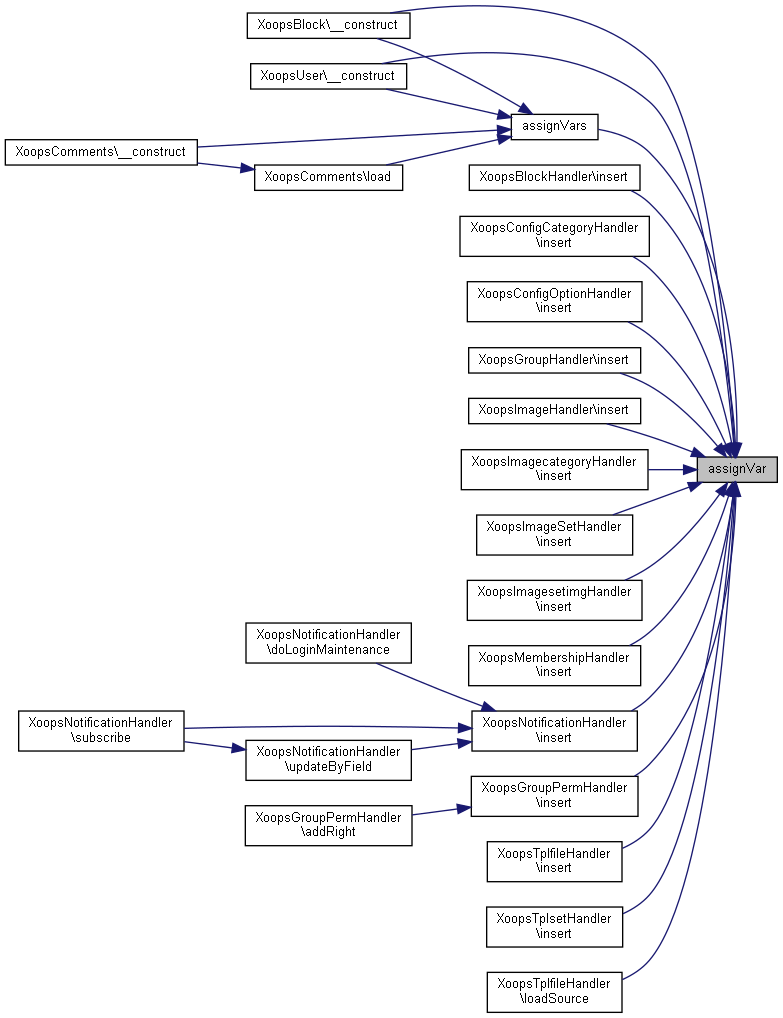
| assignVars | ( | $var_arr | ) |
assign values to multiple variables in a batch
@access private
| array | $var_arr | associative array of values to assign |


| cleanVars | ( | ) |
clean values of all variables of the object for storage. also add slashes wherever needed
YOU SHOULD NOT USE ANY OF THE UNICODE TYPES, THEY WILL BE REMOVED
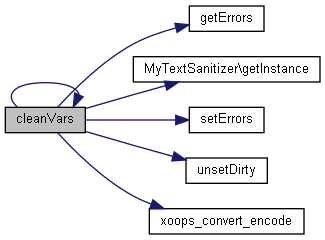
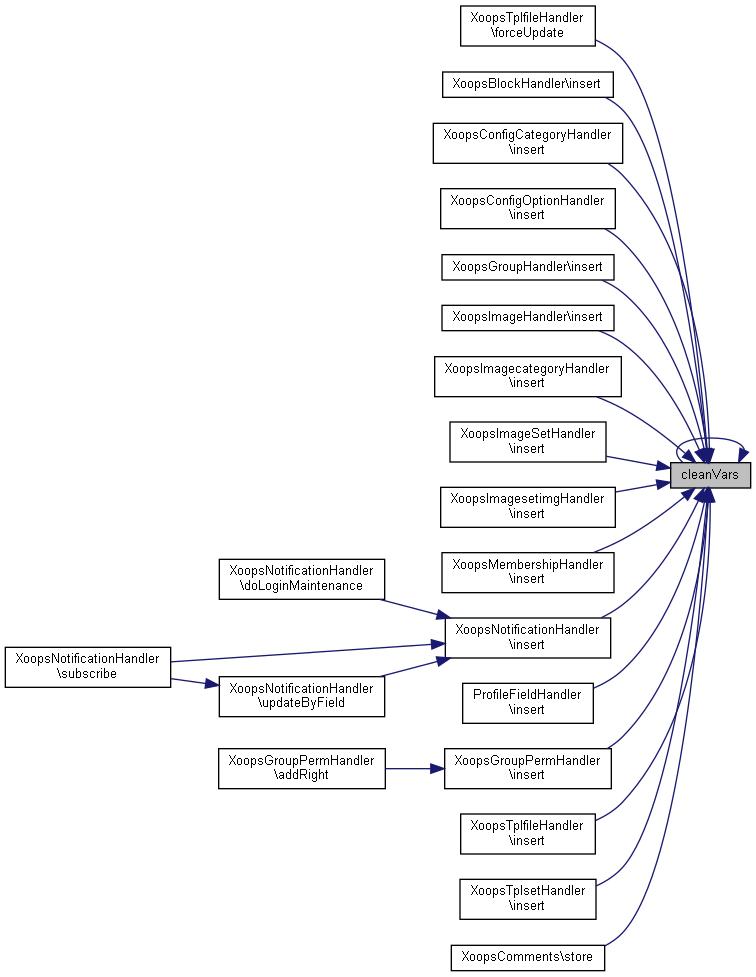
| destoryVars | ( | $var | ) |
| $var |

| destroyVars | ( | $var | ) |
unset variable(s) for the object
@access public
| mixed | $var |

| getErrors | ( | ) |
return the errors for this object as an array
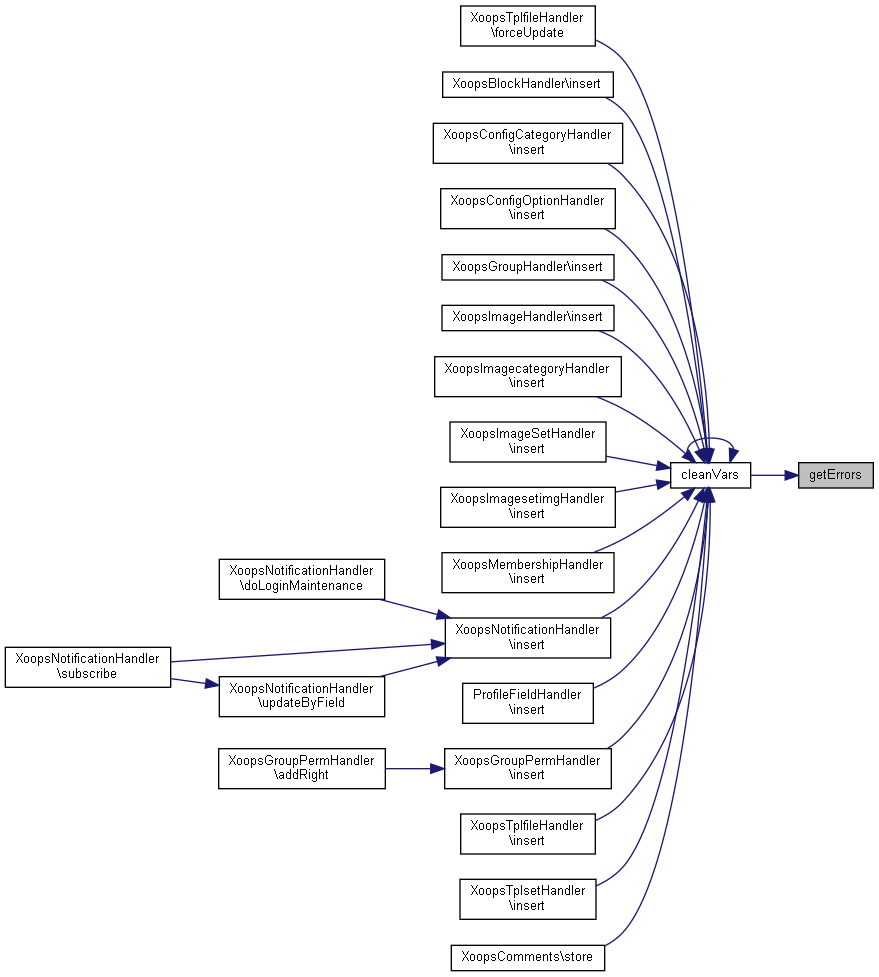
| getHtmlErrors | ( | ) |
return the errors for this object as html
| getValues | ( | $keys = null, |
|
$format = 's', |
|||
$maxDepth = 1 |
|||
| ) |
Returns the values of the specified variables
| mixed | $keys | An array containing the names of the keys to retrieve, or null to get all of them |
| string | $format | Format to use (see getVar) |
| int | $maxDepth | Maximum level of recursion to use if some vars are objects themselves |


| getVar | ( | $key, | |
$format = null |
|||
| ) |
returns a specific variable for the object in a proper format
YOU SHOULD NOT USE ANY OF THE UNICODE TYPES, THEY WILL BE REMOVED
@access public
| string | $key | key of the object's variable to be returned |
| string | null | $format | format to use for the output |
Reimplemented in ProfileField.

| & getVars | ( | ) |
returns all variables for the object
@access public
| initVar | ( | $key, | |
| $data_type, | |||
$value = null, |
|||
$required = false, |
|||
$maxlength = null, |
|||
$options = '', |
|||
$enumerations = '' |
|||
| ) |
initialize variables for the object
YOU SHOULD NOT USE THE $enumeration PARAMETER
@access public
| string | $key | |
| int | $data_type | set to one of XOBJ_DTYPE_XXX constants (set to XOBJ_DTYPE_OTHER if no data type checking nor text sanitizing is required) |
| mixed | $value | |
| bool | $required | require html form input? |
| int | null | $maxlength | for XOBJ_DTYPE_TXTBOX type only |
| string | $options | |
| string | $enumerations |

| isDirty | ( | ) |
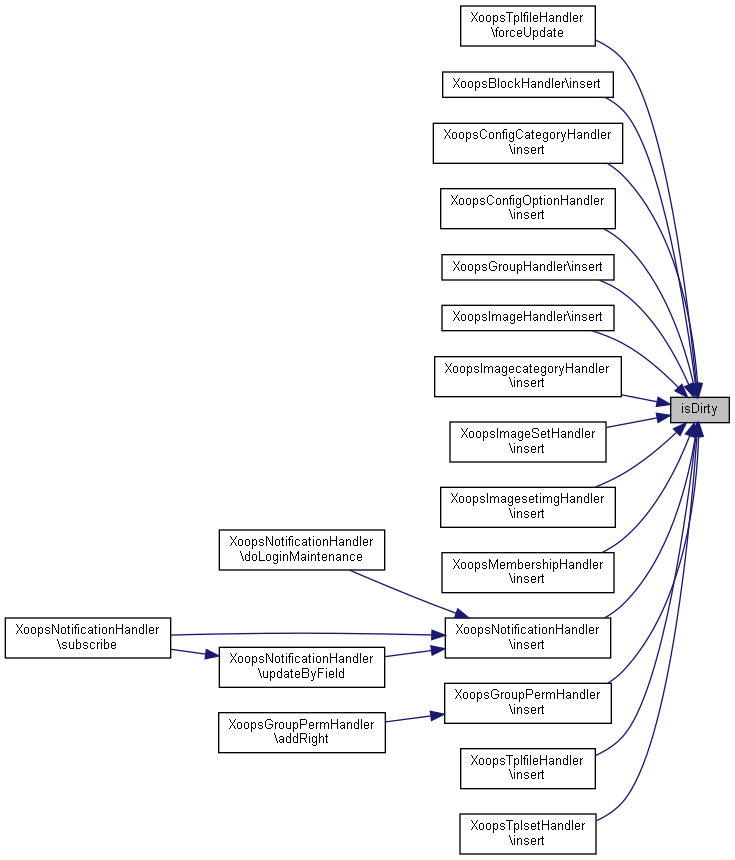
| isNew | ( | ) |
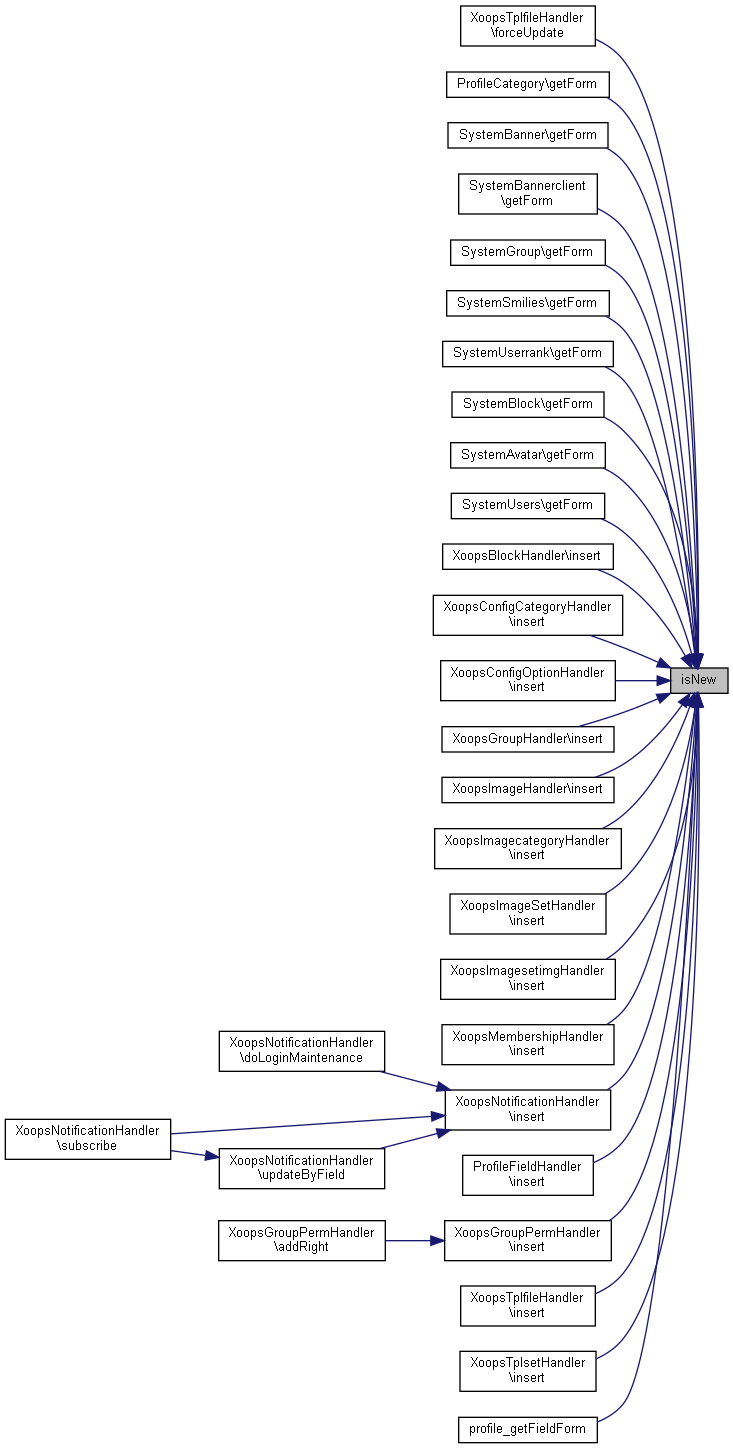
| loadFilters | ( | $method | ) |
load all local filters for the object
Filter distribution: In each module folder there is a folder "filter" containing filter files with, filename: [name_of_target_class][.][function/action_name][.php]; function name: [dirname][_][name_of_target_class][_][function/action_name]; parameter: the target object
| string | $method | function or action name |
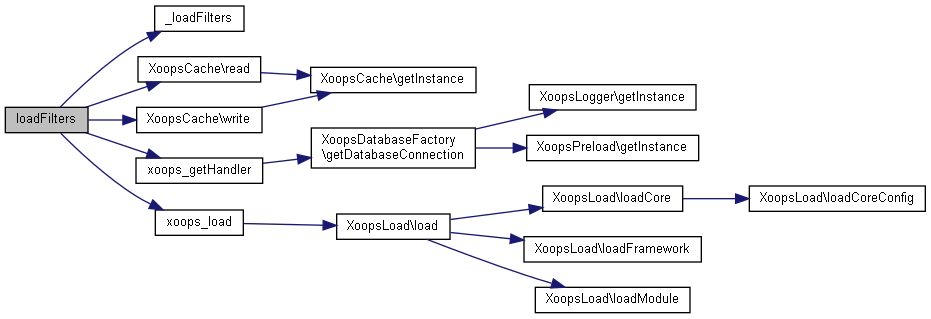
| registerFilter | ( | $filtername | ) |
dynamically register additional filter for the object
| string | $filtername | name of the filter |
| setDirty | ( | ) |
*#+ mark modified objects as dirty
used for modified objects only
@access public
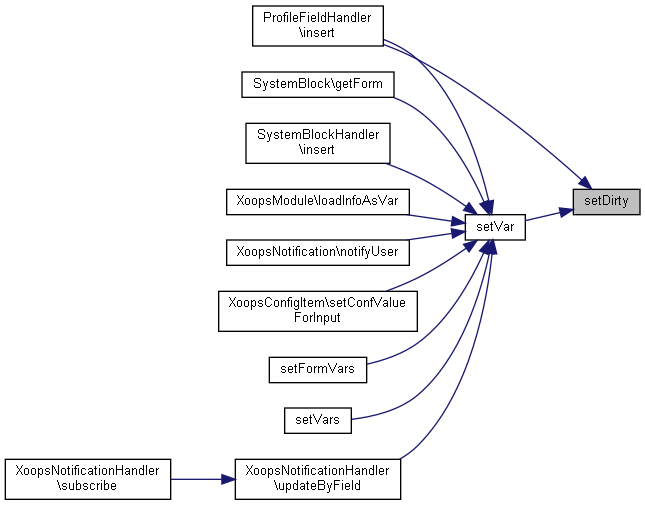
| setErrors | ( | $err_str | ) |
add an error
| $err_str |
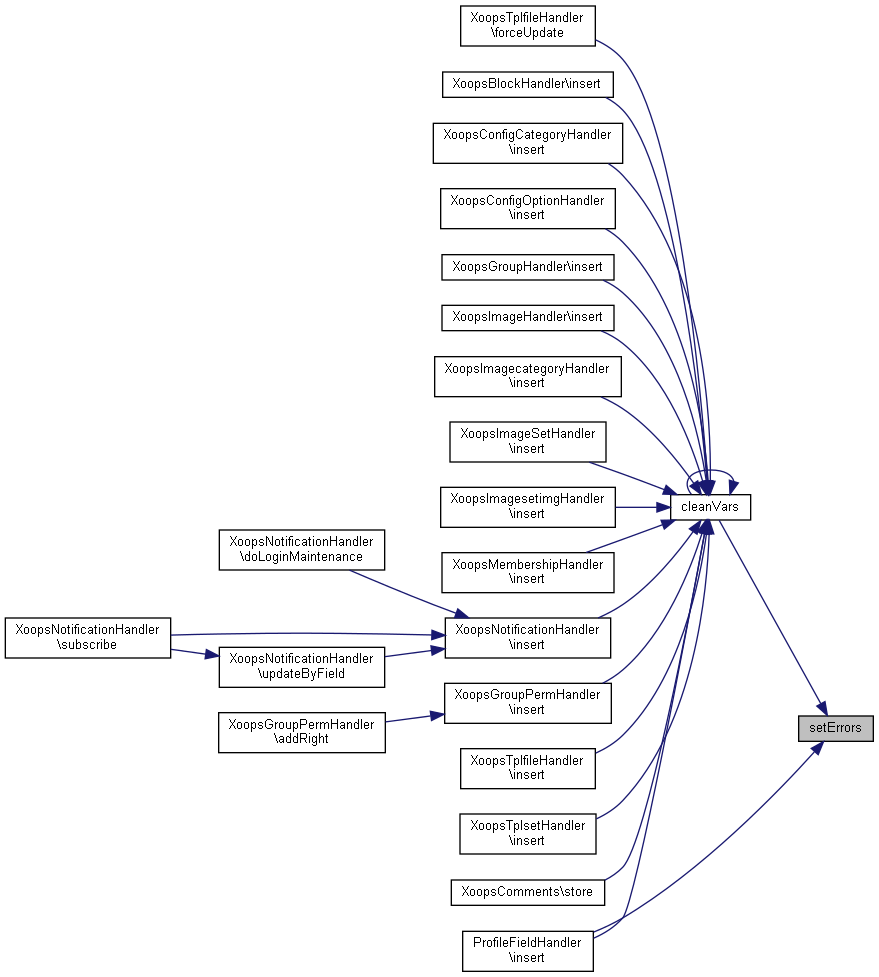
| setFormVars | ( | $var_arr = null, |
|
$pref = 'xo_', |
|||
$not_gpc = false |
|||
| ) |
Assign values to multiple variables in a batch
Meant for a CGI context:
| array | $var_arr | associative array of values to assign |
| string | $pref | prefix (only keys starting with the prefix will be set) |
| bool | $not_gpc |

| setNew | ( | ) |
*#+ used for new/clone objects
@access public

| setVar | ( | $key, | |
| $value, | |||
$not_gpc = false |
|||
| ) |
assign a value to a variable
@access public
| string | $key | name of the variable to assign |
| mixed | $value | value to assign |
| bool | $not_gpc |
Reimplemented in ProfileField.

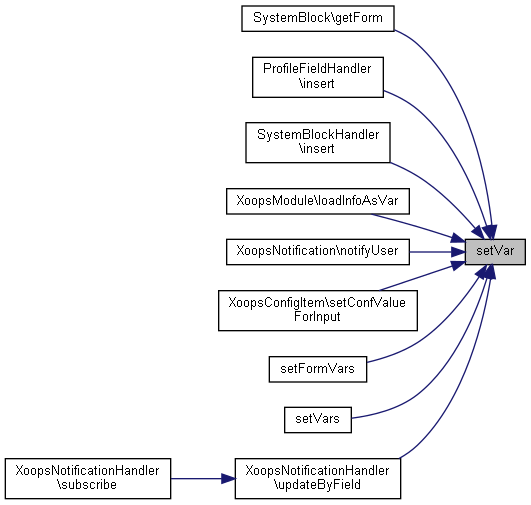
| setVars | ( | $var_arr, | |
$not_gpc = false |
|||
| ) |
assign values to multiple variables in a batch
@access private
| array | $var_arr | associative array of values to assign |
| bool | $not_gpc |

| toArray | ( | ) |
Returns an array representation of the object
Deprecated, use getValues() directly

| unsetDirty | ( | ) |
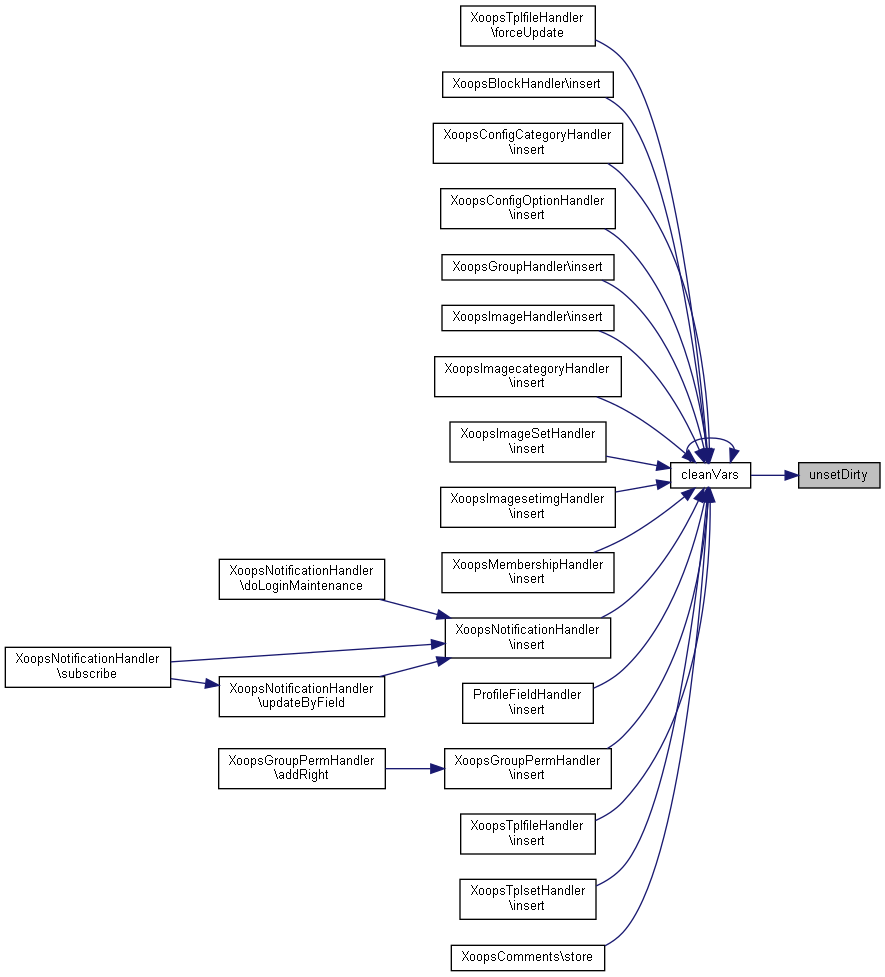
| unsetNew | ( | ) |

| xoopsClone | ( | ) |
create a clone(copy) of the current object
@access public
| XoopsObject | ( | ) |
PHP 4 style constructor compatibility shim

| $_errors = array() |
| $_filters = array() |
additional filters registered dynamically by a child class object
@access private
| $_isDirty = false |
| $_isNew = false |
| $cleanVars = array() |
| $vars = array() |